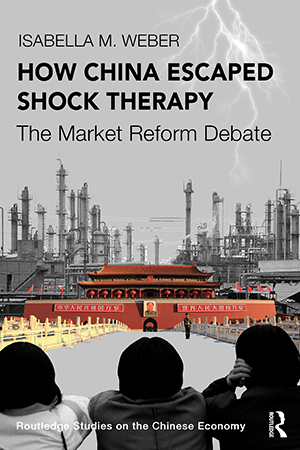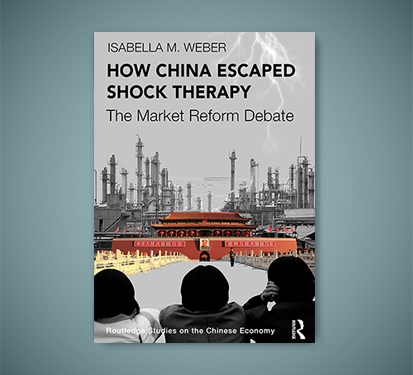>> Order book
>> Read interview with Isabella Weber on Bloomberg
>> Read LA Review of Books review
 China has become deeply integrated into the world economy. Yet, gradual marketization has facilitated the country's rise without leading to its wholesale assimilation to global neoliberalism. This book uncovers the fierce contest about economic reforms that shaped China's path. In the first post-Mao decade, China's reformers were sharply divided. They agreed that China had to reform its economic system and move toward more marketization - but struggled over how to go about it. Should China destroy the core of the socialist system through shock therapy, or should it use the institutions of the planned economy as market creators?
China has become deeply integrated into the world economy. Yet, gradual marketization has facilitated the country's rise without leading to its wholesale assimilation to global neoliberalism. This book uncovers the fierce contest about economic reforms that shaped China's path. In the first post-Mao decade, China's reformers were sharply divided. They agreed that China had to reform its economic system and move toward more marketization - but struggled over how to go about it. Should China destroy the core of the socialist system through shock therapy, or should it use the institutions of the planned economy as market creators?
With hindsight, the historical record proves the high stakes: China embarked on an economic expansion unprecedented in scope and pace, whereas Russia's economy collapsed under shock therapy. Based on extensive research, including interviews with key Chinese and World Bank officials as well as insights gleaned from unpublished documents, the book charts the debate that shaped the remaking of China’s economic system. Beyond shedding light on the crossroads of the 1980s, it reveals the intellectual foundations of state-market relations in reform-era China. Overall, the book delivers an original perspective on China's economic model and its continuing contestations from within and from without.
REVIEWS
"One of the most consequential economic debates in China over the direction of reform took place in the 1980s and focused on how markets should be created. The outcome of that debate set the pattern for much of China’s subsequent economic reforms. Isabella Weber, drawing on interviews of the participants and others together with many new sources of unpublished and published information, does a masterful job of explaining how this debate evolved and its ultimate impact."
DWIGHT H. PERKINS, Harvard University, Director of the Harvard Institute for International Development, 1980–1995
"This superb book presents the most compelling interpretation I have read of the sources of Chinese gradualism and its success in fostering economic growth and transformation while preserving enough social cohesion to hold the Chinese society together. It is the product of an independent, inquisitive, open mind—the only type that can hope to grasp the phenomenon that is modern China. It is also the work of a first-rate economist, in the best sense of that term."
JAMES K. GALBRAITH, The University of Texas at Austin, former Chief Technical adviser to China's State Planning Commission for macroeconomic reform
"Isabella Weber's book gives an excellent historical overview of China's economic statecraft bringing the reader to the crucial period of market reforms and to the decision to avoid the full implementation of the neoliberal agenda, thus setting the stage for the fastest and longest growth in world history."
BRANKO MILANOVIĆ, LSE and CUNY, former Lead Economist, World Bank Research Department
"Isabella Weber succeeds in offering a powerful account of China’s reform-era market creation that is of acute interest to economists and historians alike. Her book is a call to economists to ponder the relevance of political economy with its European roots in classical economics of the early modern era and with Chinese roots in a period almost two millennia earlier."
R. BIN WONG, Director of the UCLA Asia Institute and Distinguished Professor of History
"China’s debates in the 1980s about reform of the non-market economy are centrally important to understanding global political economy in the 21st century. The resolution of the debates about the ‘Big Bang’ set China on the course of pragmatic system reform (‘groping for stones to cross the river’) that has remained in place ever since. Isabella Weber’s study is unique. It uses information not only from a wide array of written documents but also from extensive interviews with participants in the debates. Her remarkable book provides a rich, balanced and scholarly analysis which illuminates the complex reality of this critically important period in modern world history."
PETER NOLAN, University of Cambridge, Founding Director of the University's Centre of Development Studies



